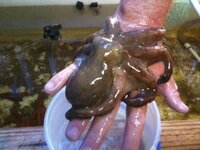I've seen them advertise on eBay (same write-up) but that is all I can offer. This is likely an individual just starting out (more less confirmed by reading their About Us page) and a review of your purchase would be welcomed. I don't see an address but the livestock is typical of the FL keys. The advantage of buying directly from the collector is the minimized handling but how much experience they have with shipping is unknown.
I am a little concerned about your over concern/expectations with "what you will get". Octopuses are very short lived and you will likely have spent more time designing and establishing your tank than you will have with your first animal. There is no breeding program for hobbyists (and very few if any left for labs) so virtually all our animals are wild caught. With a one year lifespan, this means anywhere from 2 weeks to 10 months in captivity. Even the youngest wc animals will be several months old. On a very rare occasion newly hatched (or close) animals will show up in cultivated live rock or someone will have a bimac with a successful hatching but you might keep ten wild caught animals before one like this is available. The other side of the coin is that until they are about 5 months old (give or take) octopuses are very shy and rarely seen so even if you are lucky to acquire one that is very, very young, you won't really see much of it until more or less becomes predator and not prey.
I am a little concerned about your over concern/expectations with "what you will get". Octopuses are very short lived and you will likely have spent more time designing and establishing your tank than you will have with your first animal. There is no breeding program for hobbyists (and very few if any left for labs) so virtually all our animals are wild caught. With a one year lifespan, this means anywhere from 2 weeks to 10 months in captivity. Even the youngest wc animals will be several months old. On a very rare occasion newly hatched (or close) animals will show up in cultivated live rock or someone will have a bimac with a successful hatching but you might keep ten wild caught animals before one like this is available. The other side of the coin is that until they are about 5 months old (give or take) octopuses are very shy and rarely seen so even if you are lucky to acquire one that is very, very young, you won't really see much of it until more or less becomes predator and not prey.

